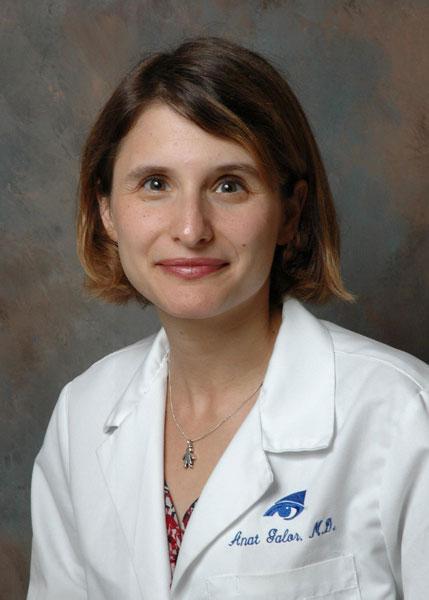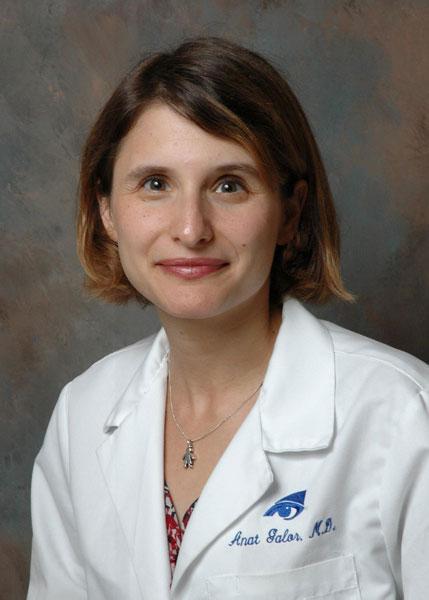
IMAGE: This is Anat Galor, M.D., M.S.P.H., associate professor of clinical ophthalmology at Bascom Palmer Eye Institute, and the lead author of a groundbreaking study, "Neuropathic Ocular Pain due to Dry…
Credit: Photo Courtesy of Bascom Palmer Eye Institute at the University of Miami.
Physician-researchers with Bascom Palmer Eye Institute, part of UHealth–the University of Miami Health System, have found a link between "dry eye" and chronic pain syndromes — a finding that suggests that a new paradigm is needed for diagnosis and treatment to improve patient outcomes.
"Our study indicates that some patients with dry eye have corneal somatosensory pathway dysfunction and would be better described as having neuropathic ocular pain," said Anat Galor, M.D., M.S.P.H., a cornea and uveitis specialist and associate professor of clinical ophthalmology at Bascom Palmer Eye Institute at the University of Miami Miller School of Medicine, and the lead author of the groundbreaking study, "Neuropathic Ocular Pain due to Dry Eye is Associated with Multiple Comorbid Chronic Pain Syndromes," published recently in the American Pain Society's Journal of Pain.
Roy C. Levitt, M.D., a neuroanesthesiologist, pain specialist, and geneticist also at the Miller School, and corresponding author, noted, "A multidisciplinary approach used for chronic pain treatment may also benefit these dry eye patients."
Galor and Levitt are part of a team of Bascom Palmer Eye Institute and UHealth physicians who treat dry eye.
Their research team evaluated 154 dry eye patients from the Miami Veterans Affairs Hospital. "Dry eye patients in our study reported higher levels of ocular and non-ocular pain associated with multiple chronic pain syndromes, and had lower scores on depression and quality-of-life indices consistent with a central sensitivity disorder," said Levitt, a professor and Vice Chair of Translational Research and Academic Affairs in the Department of Anesthesiology, Perioperative Medicine and Pain Management. "We also suspect that neuropathic ocular pain may share causal genetic factors with other overlapping chronic pain conditions."
The American Eye Institute estimates that dry eye affects about 3 million Americans every year. When the eyes do not produce an adequate supply of tears or the tears evaporate too quickly from the surface of the cornea, patients develop an "itchy" or painful sensation. Left untreated, dry eye can lead to inflammation, ulcers or scars on the cornea.
"Patients' eyes may become hyper-sensitive to stimuli, such as wind or light, or have spontaneous pain such as a feeling of burning, which is typically associated with nerve injury," said Levitt.
"Traditionally, eye specialists have treated dry eye with artificial tears or topical medications for the surface of the cornea," said Galor. "However, even if these treatments improve some dry eye symptoms, many patients continue to report underlying ocular and non-ocular pain."
Reflecting on the implications of the study, Galor said, "Our highest priority is educating physicians that dry eye represents an overlapping chronic pain condition. Consequently, a multidisciplinary approach should be considered in the diagnosis and pain management of dry eye patients."
###
Miller School co-authors were Elizabeth R. Felix, Ph.D., research assistant professor of physical medicine and rehabilitation; Jerry Kalangara, M.D.; William Feuer, M.S., scientist at Bascom Palmer Eye Institute; Dennis J. Patin, M.D., associate professor of clinical anesthesiology; Eden R. Martin, Ph.D., professor of public health sciences, and the Dr. John T. Macdonald Foundation Department of Human Genetics, and Director of the Center for Genetic Epidemiology and Statistical Genetics at the John P. Hussman Institute for Human Genomics; Konstantinos D. Sarantopoulos, M.D., Ph.D., Chief of the Division of Pain Management; former resident Derek Covington, M.D.; and medical students Alexandra E. Levitt, Katherine T. McManus and Benjamin Seiden.
About Bascom Palmer Eye Institute
In addition to its international reputation as one of the premier providers of eye care in the world, Bascom Palmer is the largest ophthalmic care, research and educational facility in the southeastern United States. More than 250,000 patients are treated each year with nearly every ophthalmic condition and more than 18,000 surgeries are performed annually. With four patient care facilities in Florida (Miami, Palm Beach Gardens, Naples and Plantation), the Institute serves as the Department of Ophthalmology for the University of Miami Miller School of Medicine, part of UHealth-University of Miami Health System. Bascom Palmer faculty members also staff the Miami and West Palm Beach Veterans Affairs Medical Centers, Jackson Memorial Hospital and Miami Children's Hospital. For information on Bascom Palmer Eye Institute, contact Marla Bercuson at (305) 326-6190 or [email protected], or visit http://www.bascompalmer.org.
Media Contact
Kai Hill
[email protected]
305-243-3249
http://www.med.miami.edu/





